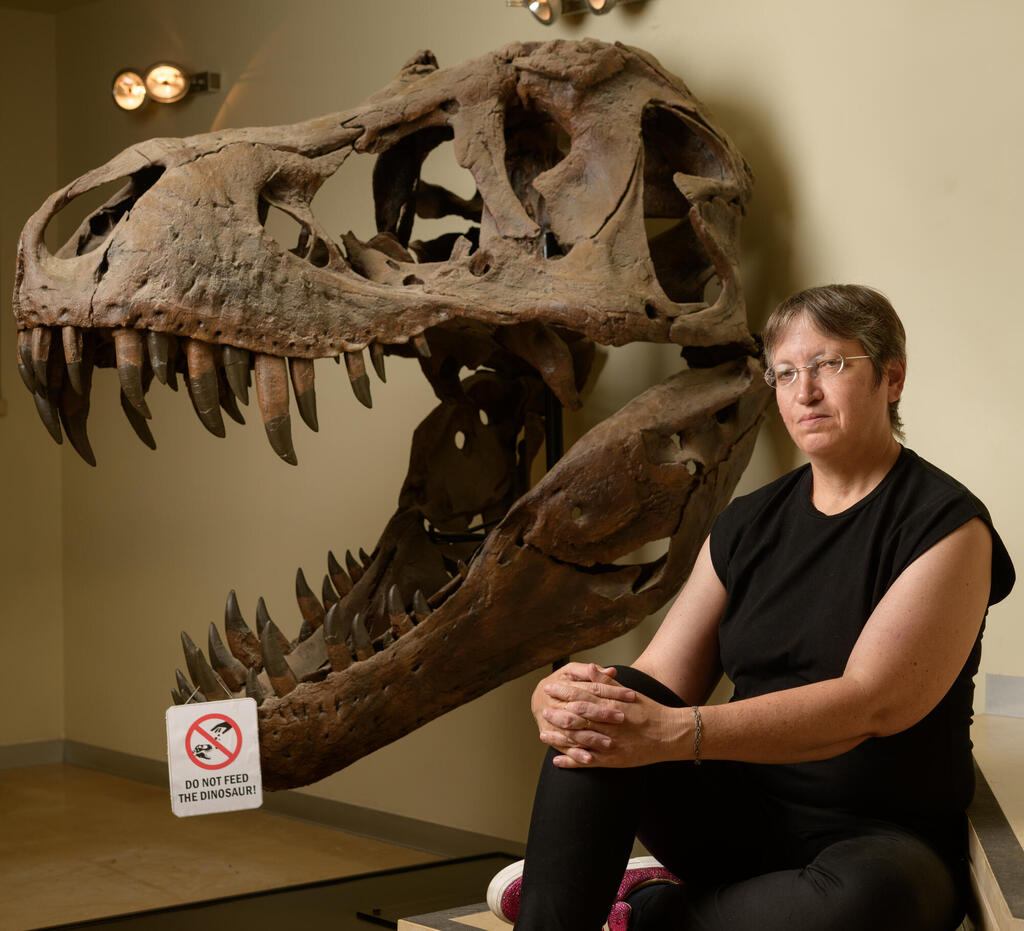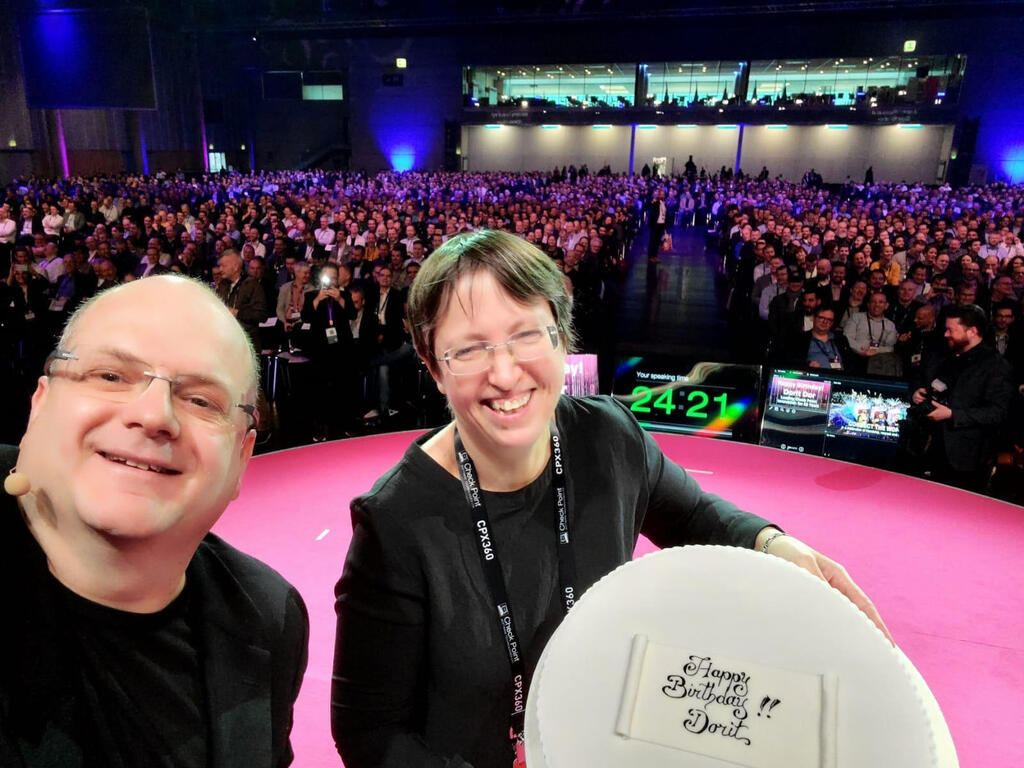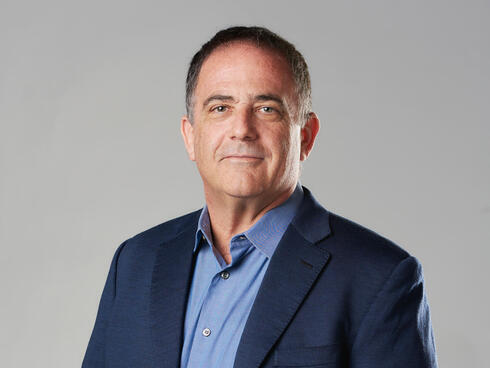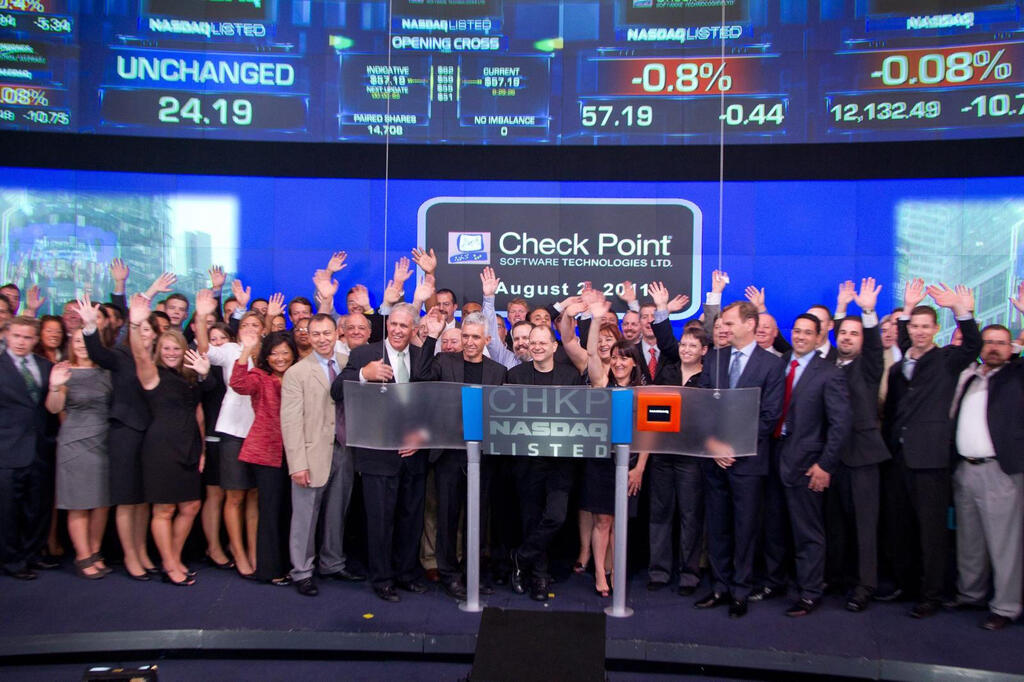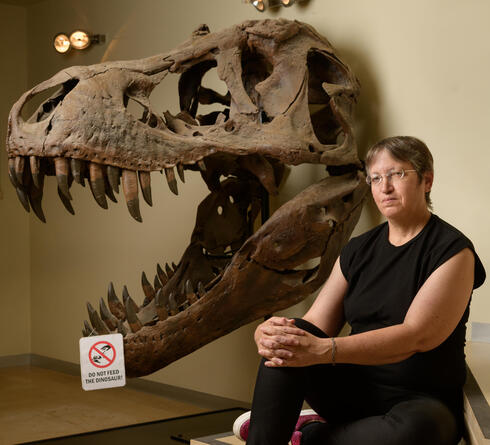
Check Point’s ‘cyber queen’ on titles, strategy, and why she never wanted the CEO job
Dorit Dor opens up about legacy, cloud rivalries, and her no-nonsense approach.
When Dorit Dor left Check Point about a month and a half ago, her colleagues gave her a farewell gift, a photo album. “My husband Tomer looked at the photos, they were all about fun: cooking events, Purim parties, mountain climbing, bike trips, massages, and he said, ‘I understand you haven’t actually worked for 30 years,’” she laughs. But of course, she has worked for 30 years. She managed development and product strategy, oversaw mergers, and held countless other roles. For most of that time, she was the trusted number two, helping lead the company alongside Gil Shwed, the dominant founder and CEO, until the end of 2024. Then, three months ago, Dor unexpectedly announced she was stepping down, citing “a focus that is shifting to other worlds, an opportunity to explore new areas.”
“It’s very emotional to leave after 30 years. Check Point is the only workplace I’ve known since finishing my IDF service, and 30 years is a long time, more than half my life. There aren’t many people who’ve stayed in the same organization that long,” Dor (58) tells Calcalist in her first interview since leaving Check Point. Just how emotional? Dor gives an example that makes it clear. “I have a child who left home, he’s married, he has a child. Sometimes I’d be happy for him to stay, but I’m also proud that he’s built his own life. It’s really similar. There’s a lot of heartache when the house is empty, the warmth and love when he’s here are missing, but it’s very clear why it should be that way. It’s the same with Check Point. It’s hard, there’s pain, it’s right and good, and still sad.”
What was the hardest part about leaving?
“I gave up leadership, managing people in an executive role, which I love and already miss. But I have no regrets. I made a choice. I always try to balance emotion with reason, and remind myself why I got to this point and why it’s good for me and everyone else.”
Dor will continue to advise the company “when they want me to,” but stepping away also means that the loyal number two did not step up to be number one, a role now held by Nadav Zafrir, a former commander of Unit 8200 and a cyber investor and executive brought in from the outside. “Nadav and I have a good relationship, I’m not leaving because they brought him in,” she clarifies.
And yet, you didn’t want to run the company you helped build?
"Being CEO isn’t the ultimate goal, it was never my ambition. Gil’s departure didn’t change that for me, either."
It’s not obvious, after so many years, it’s almost expected.
"Over the years, I did things that required deep understanding of complex technological and systemic problems. I understand organizations, I understand cyber. I filled roles that used my ‘superpowers.’ You don’t have to chase the number one spot just because it’s there. Now I want to do other things, and I can’t do both. I founded a quantum tech investment fund, Qbeat, and that’s my main focus. That’s my next evolution."
No ‘what if I were the CEO’ thoughts?
"It’s not a role I’d enjoy long term. And I already was number one in every area I managed. Running a public company means putting most of your energy into sales, marketing, quarterly reports. I could do it, but I wouldn’t enjoy it for long. If that had been my goal, I would have shaped my career very differently. In the end, you have to choose what you want to wake up for in the morning, and what you’re willing to lose sleep over at night. For me, that’s technological revolutions. You can either be a CEO or an evangelist for tech revolutions, not both. I chose."
In fact, she says, the process started long before Shwed stepped down. “Even before Gil left management, I’d already said goodbye to most of my responsibilities, product, development, M&A, and was asking myself what would still make me excited to get up every morning. To stay, I would have needed to take on a 200% executive role, and both Gil and I realized that after 30 years, it wasn’t right for me or for the company. So we didn’t even get to the conversation where they offered me the CEO job, and if we had, we’d have seen it wasn’t the right long-term solution. People should know how to leave at their peak, not when they’re on the decline. A lot of factors came together to make this the right time to leave.”
Why was timing so important for the company?
"Because both the company and I need to refresh. New people bring new perspectives, new ways to tackle problems. It’s not about age, it’s about mindset, especially in our industry, where young people can’t imagine staying in one place for five years, let alone thirty. And personally, I’m drawn to revolutions, that’s why I started the fund."
So, you and Gil reached the same point at the same time.
"Our changes weren’t directly linked, but Gil also knows 30 years is a good milestone to reassess."
Is Nadav right for the company?
"He has a different mindset, and a chance to shake things up. He works hard, he’s much more outward-facing than we were in the past, he’s out there meeting customers, and he’s obsessed with them. A good CEO instills that in the company. Coming in from outside helps too, the content matters, but so does perception. Someone without all the historical baggage can make cleaner decisions and take new risks."
And your next step is the fund?
"Yes, and it means giving up managing people, which I love and am good at, so that’s not easy. But it’s a deliberate choice. I’m a technologist at heart, I love building what I love, and I’m happy with that choice. Maybe one day I’ll have a brilliant idea for a startup, who knows?"
An open garden without a pompous title
Dor lives in Hod Hasharon with her partner Tomer; they have two sons. Together, the family holds 11 academic degrees (and the younger son is working on the 12th). Dor has a PhD in computer science, Tomer specialized in computer science and management, their eldest son Gal has a PhD in mathematics, and their younger son Idan is pursuing a master’s in the same field. Their geeky home reflects these passions, there’s even a life-size dinosaur skull, but the new star is their grandson Yotam, one year old. That’s why “Quantum Physics for Babies” now sits alongside toys and a backyard playset. “But I’m against the title Grandma,” Dor laughs. “Yotam can call me by my first name. ‘Grandma’ is such a heavy title!”
Dor grew up in Givat Shmuel, the daughter of statistician Shaya and architect-turned-sculptor Leah Dolinsky. From an early age she leaned toward science. In high school, she studied math and physics and took programming courses at Bar-Ilan University. She then served in the IDF’s elite Unit 8200 until age 25, earning the Israel Defense Forces Prize, “Even my parents don’t know what for.”
After leaving the IDF in 1995, Dor joined Check Point, then just two years old, through Shlomo Kramer, one of the founders. “We studied together at university and served in similar roles in the army. He brought me in. The industry was so young, I didn’t think I had the right experience, but I quickly felt at home. They trusted me, even when I made mistakes. They let me try different roles and grow.”
And, as her husband’s reaction to that farewell album showed, it was fun, too. “There were lots of meals, events, gatherings,” she recalls. “Meals we made for charity, cooking classes for employees and their partners, so many memories.”
Give an example?
"In July 2010, as part of a training session for the management team on customers and sales, we went to Carmel Market to test sales tactics. Everyone had to boost sales at their assigned stall. Gil had to sell vegetables, I had to sell watermelons. You had to understand what customers wanted and how to approach them creatively. I gave passersby samples to show mine were the best. At one point, a neighbor saw me and thought I’d left my job to sell produce at the market!"
And what did you learn from that? What does selling watermelons teach you about the cyber world?
"It shows you that different life skills are needed, someone who’s excellent at security isn’t necessarily great at selling watermelons, and vice versa."
And security is exactly where she excels. “Cyber Queen,” Gil Shwed called her at her farewell event. Dor has been in the field for 40 years, back when it was still called “information security,” and she has become one of Israel’s most prominent experts and a global authority. Over her decades at Check Point, she represented the company at major international events, including the World Economic Forum. But most of the real work happened inside the company, building the cybersecurity empire that now sells more than $2.5 billion a year and employs 6,000 people worldwide. “You have a fundamental stake in this institution that protects the world,” Shwed told her in his tribute.
Despite that legacy, Dor’s title never truly captured the scope of her role. “For many years, I was called VP of Product, even when I was doing a lot more, M&A, growth, R&D, business development, all without a fancy title.”
Why?
"Because titles never interested me. I managed managers across different areas that weren’t always directly connected. I didn’t need a seven-word title with ‘International’ and ‘Chief’ in it. When I took on more responsibilities, I didn’t bother changing my title. Even when they offered, I’d say, ‘Not interested.’ The substance is what matters."
So you don’t really connect with the title mania in today’s high-tech scene?
"Sometimes I understand the need for it, but I didn’t need it. I get that you have to tell the world what you do, as long as the title means something. But sometimes it turns into a race for words that ends up empty of real content."
Check Point, which Dor helped lead, has long been seen as conservative, very much in the image of Shwed. The company stockpiled billions in cash, made acquisitions sparingly and at measured valuations, and grew slowly but steadily. That approach stood in stark contrast to competitor Palo Alto Networks, which chased big leaps and splashy acquisitions. Some in the industry appreciated Check Point’s cautious approach; others saw it as a risk, worried that slower growth would leave it vulnerable.
"It’s true, we didn’t buy company after company at absurd prices just to enter every new field," Dor says. "That’s Gil’s worldview, there’s a conservatism to it, and that’s often what kept Check Point stable. I don’t worship conservatism as an ideology, it just fit the company. People forget how many companies took wild bets and crashed because they lost focus or jumped into markets where they couldn’t succeed. We remember the good bets, not the bad ones. But at Check Point, there were no bets. The idea was: let’s grow by selling what we understand, and for more money. That has its advantages."
Did you ever want Check Point to be bolder, to make bigger moves in the cloud, for example?
"Sure, there were areas where I wanted us to do more, but at my level, I owned those decisions too, whatever Check Point did, I took responsibility for. Well, except for the decision not to do car leasing," she laughs.
How do you see Check Point today?
"It knows how to stay relevant and innovative. It’s still very Israeli, it’s still the symbol of Israel as the cyber capital. Palo Alto isn’t Israeli."
Wiz, the five-year-old cloud security company, was just sold to Google for $32 billion. Check Point, which is 30 years old, is valued at under $24 billion.
"Wiz is a great company, doing great things, but it still spends more than it earns. Check Point has more customers and more revenue."
Nadav Zafrir, Check Point’s new CEO, partnered with Wiz. Does that partnership mean Check Point is admitting weakness in the cloud space where Wiz excels?
"No. There are areas in cloud security where Check Point is strong, in prevention, for example. And where Wiz’s solution is better, we decided it’s smarter to join forces. The result is a package with parts that aren’t ours, but the customer is happier, and that’s better than insisting that every piece must be our own. It’s an ‘open garden’ concept: you add other people’s strengths to your garden instead of reinventing the wheel every time. If you try to do everything alone, the customer will keep comparing you to every other solution. The open garden approach lets us give the best answers, even if they’re not all ours."
Then they said I should raise a Tamagotchi
Dor’s wide-ranging career has always included efforts to bring more women into tech, such as her involvement in SheCodes. “Being the only woman in the room has its advantages,” she says, reflecting on decades of being the lone woman at the table. “It makes you stand out, people remember you. But that’s no reason to keep things this way. We need more women. Without them, half of human talent is wasted. And women in management make for good management. I don’t see myself as super-feminine, but take this example: a man who gets lost will walk for another half hour before asking for directions. Women lead more collaboratively, it’s group-based, it gives people space.”
Bringing more women in inevitably raises questions, and Dor faced them herself. She joined Check Point because “Kramer knew me from the army as a workaholic, but when I got there I said, ‘I don’t know how I’ll be as a working mother.’ He said, ‘I’m not worried,’ and that was it.”
And were you worried? How did it work out?
"We found solutions. For 18 years, we had an afternoon nanny, she was basically the chief of staff of our household. My kids and everyone around me respected how much I loved my work, and above all, I felt it was the right thing for me, no guilt."
Still, there were critics. “When Gal, my eldest son, was three, he once said, ‘Mom lives at work.’ Later, I told this story in an interview for a parenting magazine, and their headline was: ‘Give her a Tamagotchi.’ The idea was that people like me shouldn’t be parents, better we just raise digital pets. I wasn’t fazed by it. I believed I was doing okay. I’m 2,000% at peace with my choices. And when I look at my kids today, I know they weren’t harmed by it. They know they can come to me when they need to.”
At home and at work, Dor has always kept the same direct style. “It’s the philosophy of What You See Is What You Get — WYSIWYG,” she explains. “It’s a computer term, meaning what you see on the screen is what you get. That was a core principle at home too. If I’m angry with you, I say so. That’s it, there’s no iceberg between us. If I’m not excited, I say so. Other people bottle things up, but with me, you’ll see it on my face if I like something or not.”
Quantum Leap, a Leap Into Tomorrow
Dor is now channeling that same philosophy into her new investment fund, which she co-founded with Maya Netser, a lawyer, entrepreneur, and investor. The focus is quantum computing, and the fund, which has invested in three companies so far, is the only one in Israel dedicated solely to the field, and among the few worldwide. While the world is fixated on AI, Dor sees the next revolution in technology that unlocks faster, more powerful computing based on quantum mechanics.
"I got swept up in the cyber revolution, which was huge. But there are always new revolutions, and it’s exciting to be part of them. I see a massive revolution coming in quantum computing. It works differently, it can tackle problems that were unsolvable before," she says. “I don’t need a job or a title anymore, this is my way to join a revolution that will reshape the world. It’s exciting and challenging.”
Which companies have you invested in so far?
"The Israeli startup Quamcore, which develops hardware solutions to boost quantum computer efficiency. The second is Classiq, also Israeli, which builds software to make quantum computers accessible for practical applications. And the third is a Dutch company, OrangeQS, which makes test equipment for quantum systems."
But the quantum revolution isn’t here yet, is it?
"Not yet. There are quantum computers, but they aren’t big enough yet to solve problems that can’t be solved any other way. The breakthrough will come when they can, for example, discover a material with exactly the right properties out of countless possibilities, a molecule for a new drug or a chemical for industry. That’s when you’ll see real breakthroughs. It’s not just about computing power, quantum computers work differently. They can simulate the behavior of small particles in ways that classic computers can’t."
Does that have implications for cyber too, the field you know best? Will quantum computing create new risks that need new protections?
"Absolutely. A powerful quantum computer would break one of the main assumptions behind current encryption. Any security system that relies on today’s encryption would have to be replaced. That threat might not be real for another 10 years, but we need to prepare now. There are attackers who record conversations today so they can break the encryption with quantum tools later. Maybe no one cares what you tell your bank in July 2025, but between countries? Record now, decode later. We need to start defending against that today."









